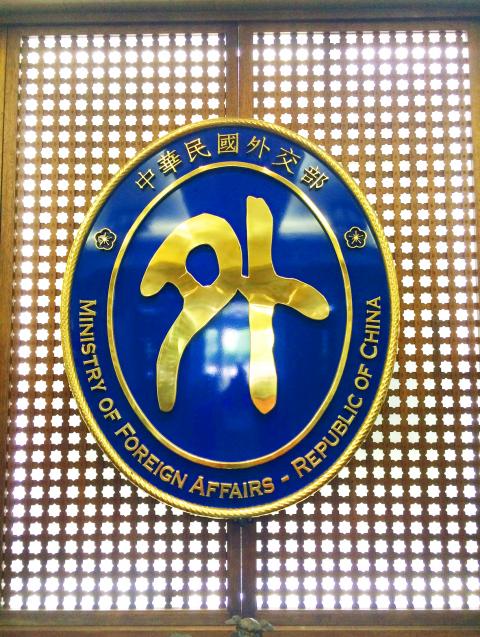The sale of F-16V jets by the US to Taiwan has not been put on hold, the Ministry of Foreign Affairs said yesterday, denying a US media report that the administration of US President Donald Trump has temporarily set aside the sale to facilitate a trade agreement with China.
Taipei has maintained close communications with Washington since a letter of request to purchase the jets was submitted to the US, ministry spokesman Andrew Lee (李憲章) said.
The US is conducting a review and “the sale has not been shelved,” Lee said.

Photo: Lu Yi-hsuen, Taipei Times
The ministry’s comments came in response to a Time magazine report on Friday that said — citing three anonymous US officials — that the administration had shelved the sale until a trade deal with China is sealed.
The White House’s initial decision, reported late last month, to offer tacit approval for Taiwan to buy 60 Lockheed Martin F-16Vs was widely seen as a US show of strength against China, Time said.
However, the decision to delay approval of the sale has contributed to concern among some in the administration that Trump might go soft on China in his desire to secure a trade deal, it said.
It cited the officials as saying that the draft trade agreement being negotiated would boost Trump’s political fortunes and ease jittery stock markets, but it is unlikely to address many of the issues at the core of the US-China trade dispute.
The US Congress must also approve any arms sales to Taiwan, and the administration has yet to submit such a request to lawmakers, the magazine said.
The US Department of State, which opposed the proposed arms sale, has also called for an interagency meeting to determine whether the US can sell M1 Abrams tanks to Taiwan, Time quoted an administration official as saying.
However, Lee said that the relationship between Taiwan and the US has been close and cordial.
“Since President Trump’s inauguration, the US has sold arms to Taiwan twice, demonstrating its firm support for Taiwan’s security,” Lee said.
High-ranking US officials have publicly reiterated their support for the Taiwan Relations Act (TRA), he added.
Signed into law on April 10, 1979, following Washington’s switch of recognition from Taipei to Beijing, the TRA authorizes the US to provide Taiwan with defensive arms.
The Ministry of National Defense yesterday said that the Time report was not based on fact and that US arms sales to Taiwan are in accordance with the TRA and the “six assurances.”
The American Institute in Taiwan said it does not comment on proposed arms sales.
“We only comment after they have been notified to Congress,” the institute said.

AGING: As of last month, people aged 65 or older accounted for 20.06 percent of the total population and the number of couples who got married fell by 18,685 from 2024 Taiwan has surpassed South Korea as the country least willing to have children, with an annual crude birthrate of 4.62 per 1,000 people, Ministry of the Interior data showed yesterday. The nation was previously ranked the second-lowest country in terms of total fertility rate, or the average number of children a woman has in her lifetime. However, South Korea’s fertility rate began to recover from 2023, with total fertility rate rising from 0.72 and estimated to reach 0.82 to 0.85 by last year, and the crude birthrate projected at 6.7 per 1,000 people. Japan’s crude birthrate was projected to fall below six,

Conflict with Taiwan could leave China with “massive economic disruption, catastrophic military losses, significant social unrest, and devastating sanctions,” a US think tank said in a report released on Monday. The German Marshall Fund released a report titled If China Attacks Taiwan: The Consequences for China of “Minor Conflict” and “Major War” Scenarios. The report details the “massive” economic, military, social and international costs to China in the event of a minor conflict or major war with Taiwan, estimating that the Chinese People’s Liberation Army (PLA) could sustain losses of more than half of its active-duty ground forces, including 100,000 troops. Understanding Chinese

US President Donald Trump in an interview with the New York Times published on Thursday said that “it’s up to” Chinese President Xi Jinping (習近平) what China does on Taiwan, but that he would be “very unhappy” with a change in the “status quo.” “He [Xi] considers it to be a part of China, and that’s up to him what he’s going to be doing, but I’ve expressed to him that I would be very unhappy if he did that, and I don’t think he’ll do that. I hope he doesn’t do that,” Trump said. Trump made the comments in the context

SELF-DEFENSE: Tokyo has accelerated its spending goal and its defense minister said the nation needs to discuss whether it should develop nuclear-powered submarines China is ramping up objections to what it sees as Japan’s desire to acquire nuclear weapons, despite Tokyo’s longstanding renunciation of such arms, deepening another fissure in the two neighbors’ increasingly tense ties. In what appears to be a concerted effort, China’s foreign and defense ministries issued statements on Thursday condemning alleged remilitarism efforts by Tokyo. The remarks came as two of the country’s top think tanks jointly issued a 29-page report framing actions by “right-wing forces” in Japan as posing a “serious threat” to world peace. While that report did not define “right-wing forces,” the Chinese Ministry of Foreign Affairs was